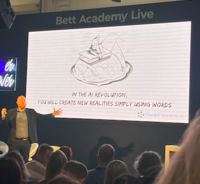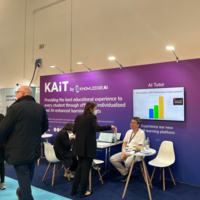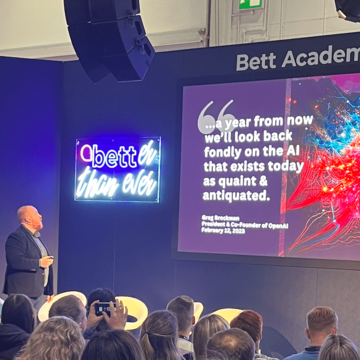BETT 2023: Ed-Tech on the Brink of the AI Revolution
The BETT ed-tech conference is an annual event that brings together educators, innovators, and industry experts from around the world to showcase the latest advancements in education technology. Held at the ExCel in London, BETT 2023 was no exception, providing a platform for cutting-edge technologies, innovative teaching methods, and groundbreaking ideas that have the potential to revolutionize the way we teach and learn.
Confession time: I didn’t write the first paragraph of this blog post. AI did – or, more specifically, ChatGPT, the conversational model trained by OpenAI that’s currently making waves throughout the education sector. The question is, could you tell? The style is a little impersonal, perhaps. It reads more like an advert for the event than a personal reflection on it – but that’s most likely the fault of my prompt, which simply asked ChatGPT to “write the opening paragraph of a blog post explaining what the BETT ed tech conference is”. Given that’s all it had to go on, ChatGPT did a remarkably good job of setting the scene and kicking off the blog. It’s easy to see why educators are excited and apprehensive in equal measure.

Perhaps Conversational Learning – our project on AI-powered, message-based learning resources – has skewed our perspective, but the buzz and anxiety surrounding ChatGPT specifically, and AI technologies more broadly, seemed to dominate this year’s BETT. A talk by Dan FitzPatrick, author of The AI Classroom: The Ultimate Guide to Artificial Intelligence in Education, was so hotly anticipated that crowds began to gather outside more than half an hour before the event. When we made it into the room – and not everyone did – it was standing room only, and about as crowded as the main stage at a music festival.
Fitzpatrick’s talk showcased the incredible potential of generative AI to support educators. When we think of ChatGPT in relation to schools, we typically think of students using it to auto-generate their essays to the frustration and despair of their teachers. However, Fitzpatrick turned the tables, demonstrating that ChatGPT can also be used to take a first pass at marking essays (as long as you give it the mark scheme). It can devise lesson plans and homework tasks, create the content for simple worksheets and draft curriculum statements of intent. Used in combination with AI image, video and voice generators, it can even be used to create talking avatars of famous people from history – as Fitzpatrick demoed via a cartoon Henry VIII, to the general amazement of the crowd.
ChatGPT’s work needs checking and editing, of course; a chatbot can’t be left to have the final say on a student’s grade! But, as a former teacher himself, Fitzpatrick understands the immense pressures faced by educators: the evenings and weekends eaten up by planning, marking and endless admin. Generative AI can expedite those tasks, freeing up time and energy for teachers to focus on face-to-face teaching. Strikingly, when asked for a show of hands, most teachers in the audience said they were already experimenting with ChatGPT in their working lives. This, more than anything else at BETT 2023, opened our eyes to the generative AI revolution already unfolding across the education sector. New edtech resources – including our future Conversational Learning prototype – need either to incorporate or respond to these developments in AI in order to be relevant for learners and educators going forward. Recent news stories about the impact of ChatGPT on educational publishers only confirm this point.


In the exhibitor arenas, AI was the buzzword, from electronic pens that track writing patterns and tailor work accordingly, to AI driving simulators, to quizzes that become easier or harder depending on how well the learner is doing. These wide-ranging technologies all rely on algorithms to process the learner data they receive and present content for the appropriate skill level. Beyond a few toy robots programmed to answer questions using ChatGPT, however, there was little evidence of generative AI among the technologies and resources on show. This is indicative of how much the technology has developed over the past six months. Most exhibitors at BETT 2023 are likely to have signed up before the launch of ChatGPT on 30 November last year. No doubt generative AI will be far more prominent in the product arenas at BETT 2024.
Given the speed of change in the field, it’s hard to predict what kinds of edtech AI wizardry will be on display at BETT next year. One thing, though, is evident: the next generation of learning resources will need not only to harness generative AI to teach the existing curriculum, but also to train learners and educators in how to use it effectively and ethically, in the classroom and beyond.



